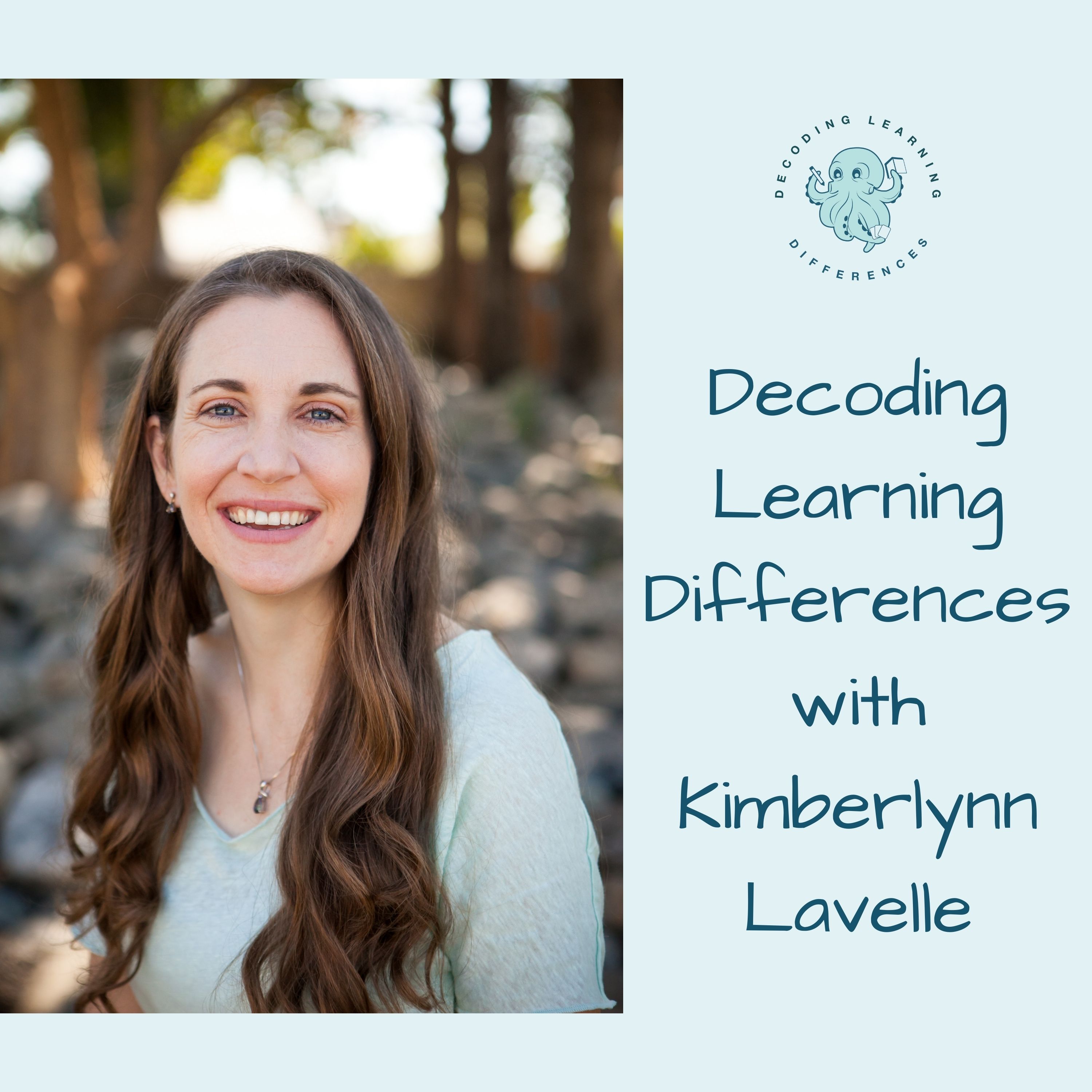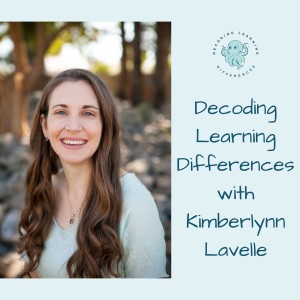

I teach parents how to educate their own children (especially those with struggling learners) so that they can successfully and peacefully homeschool or provide supplemental education at home. This podcast will discuss: - various learning disabilities and challenges, including: ADHD, dyslexia, autism, processing disorders, and so much more! - how all people learn - different learning styles - strategies for supporting specific learning challenges - how to apply these learning strategies at home - stories from homeschooling parents -interviews from other experts
I teach parents how to educate their own children (especially those with struggling learners) so that they can successfully and peacefully homeschool or provide supplemental education at home. This podcast will discuss: - various learning disabilities and challenges, including: ADHD, dyslexia, autism, processing disorders, and so much more! - how all people learn - different learning styles - strategies for supporting specific learning challenges - how to apply these learning strategies at home - stories from homeschooling parents -interviews from other experts
Episodes

Monday Jun 19, 2023
Educating the Different Learner: Dyscalculia
Monday Jun 19, 2023
Monday Jun 19, 2023
Last week we dove into the latest research on the best educational methodologies for children with dyslexia (including some methodologies that the latest research supports but have been around for over a hundred years!).
This week we’re diving into a topic that is a bit more complicated, because there is WAY less research.
This week we’re talking about the best methods for educating a child with dyscalculia.
There may not be as much research, but there are things we do know to do and things we know NOT to do.
Click here to watch, listen, and learn!
While you’re here, be sure to subscribe, rate, and write a review to help others discover all that you have found so helpful!

Monday Jun 12, 2023
Educating the Different Learner: Dyslexia
Monday Jun 12, 2023
Monday Jun 12, 2023
In this week’s episode, I am giving some clear guidelines on the best methodologies for educating children with dyslexia, based on the most current research.
Click here to watch, listen, and learn!
While you’re here, be sure to subscribe, rate, and write a review to help others discover all that you have found so helpful!

Monday Jun 05, 2023
Unshakeable Parenting Confidence with Andrea Pollack
Monday Jun 05, 2023
Monday Jun 05, 2023
After that long IEP Tips series, I’m excited to offer you an interview today!
Today’s episode is an interview with Andrea Pollack of Autism Parent Solutions. Whether or not you have a child with autism, be sure to listen because you WILL gain insight!
One of the biggest things that is explored in this episode is Unshakeable Parenting Confidence!
Learn a bit about Unshakeable Parenting Confidence from Andrea Pollack of Autism Parent Solutions. Find more about her at: AutismParentSolutions.com!
While you're here, be sure to subscribe, rate, and write a review to help others discover all that you have found so helpful!

Monday May 22, 2023
IEP Tips: IEP v 504
Monday May 22, 2023
Monday May 22, 2023
This week’s final episode stems from the position many families find themselves in of being offered a Section 504 plan when what they really wanted for their child was an IEP. We go into the differences and similarities of these two educational supports to hopefully allow families to make the decision that is best for their child!
Watch the video or download the audio for this week’s episode where we discuss your options and my recommendations.

Monday May 15, 2023
IEP Tips: Keeping an IEP
Monday May 15, 2023
Monday May 15, 2023
Last week we went through all the steps of GETTING an IEP for your kiddo, but another common question is around how to keep the school from taking that IEP away.
Every three years, the school district must determine if your child is still “eligible” for an IEP and while this brings updated information, it can also mean that the school may recommend “exiting” your child from special education/ an IEP.
And that’s amazing news! Your child is doing so well that the school thinks your kiddo will be just fine without an IEP!
Take a moment to celebrate your child’s successes (even if you disagree!).
And if you disagree and don’t want your child exited?
Watch the video or download the audio for this week’s episode where we discuss your options and my recommendations.

Monday May 08, 2023
IEP Tips: Getting an IEP
Monday May 08, 2023
Monday May 08, 2023
Many families assume that a school will recognize if their child is struggling and will assess them and put them on an IEP if that is needed, all without the parents saying anything. And, honestly, that’s how it’s supposed to work. For many children, that is exactly how it does work.
However, for many other kids, their needs get brushed aside and they are never assessed, and never put onto an IEP unless a parent or guardian steps in and advocates for them.
So how do you get your child an IEP?
First, write a letter to the school (all the details are in the episode). Then, be sure that your school follows the law and responds correctly. Too many schools don’t know the law and unintentionally break it all the time. Oops!
Get all the details by listening to this week’s episode!

Monday May 01, 2023
IEP Tips: IEE
Monday May 01, 2023
Monday May 01, 2023
Sometimes, we need a second opinion.
If you’re feeling that the school’s report didn’t find give you the answers you needed regarding why your child is struggling, you might need a second opinion.
And the beauty of the system is that you can request an IEE that is free of charge to you.
I don’t encourage the use of this option for most people, as it is a big expense to school districts and we’d probably have them use that money to actually educate our children and their teachers well.
Click here to watch the video or download the audio for this week’s podcast!
Do you have concerns about your child’s IEP reports?

Monday Apr 24, 2023
IEP Tips: Accommodations
Monday Apr 24, 2023
Monday Apr 24, 2023
Are Accommodations the most important part of an IEP?
Last week we dove into the importance of well-written IEP goals and this week we’re going to another section of the IEP.
The Accommodations section of an IEP is, for many kids, the single most important section of their IEP!
For kids who are able to understand and participate in grade level content, accommodations may be the thing keeping them in a general education class all day long, feeling successful and knowing that they are rocking it!
For kids who struggle a bit more, accommodations are still allowing them to see their own areas of genius and feel good about themselves.
Click here to watch the video or download the audio for this week’s podcast!
Then go check your kid’s accommodations. Are they crystal clear to you? Do they need some explanation (and therefore, a rewrite)?
Let me know!

Monday Apr 17, 2023
IEP Tips: Goals
Monday Apr 17, 2023
Monday Apr 17, 2023
When we’re looking at IEP goals, we don’t want just an emotional impression of what we think the IEP is supposed to guide. We need it to be crystal clear so that there is no confusion as to whether or not a child met that IEP goal.
Those goals need to leave no room for interpretation. If 2 different teachers both read that goal, will they use entirely different methods of measurement? If so, the results will likely be vastly different.
Unfortunately, many special education teachers are never taught how to write really good goals. They get barely any guidance at all and even the “goal banks” that the teachers use are full of poorly written goals.
Click here to watch the video for this week’s podcast!
Then go check your kid’s goals. Are they crystal clear to you? Do they need some explanation (and therefore a rewrite)?
Let me know!

Monday Apr 10, 2023
IEP Tips: Parts of an IEP
Monday Apr 10, 2023
Monday Apr 10, 2023
When it comes to IEPs, knowing how to read them helps us know where to look to find the important stuff within them.
An IEP document 30 years ago was 2 pages long. Now IEPs are often more than 30 pages long. They can be so large and overwhelming that many parents need help looking them over, understanding them, and knowing if the IEP is providing what their child needs.
While I actually love analyzing IEPs and doing consultations with families, I also want to help everyone understand IEPs better so that everyone can make an educated decision when it comes to their child’s IEP.
Click here to watch or download the audio for this week’s episode: IEP tips: Parts of an IEP.
Next week we’ll start going deeper into some of the most important parts of an IEP to help you analyze them in more detail. Be sure to rate, review, and subscribe!